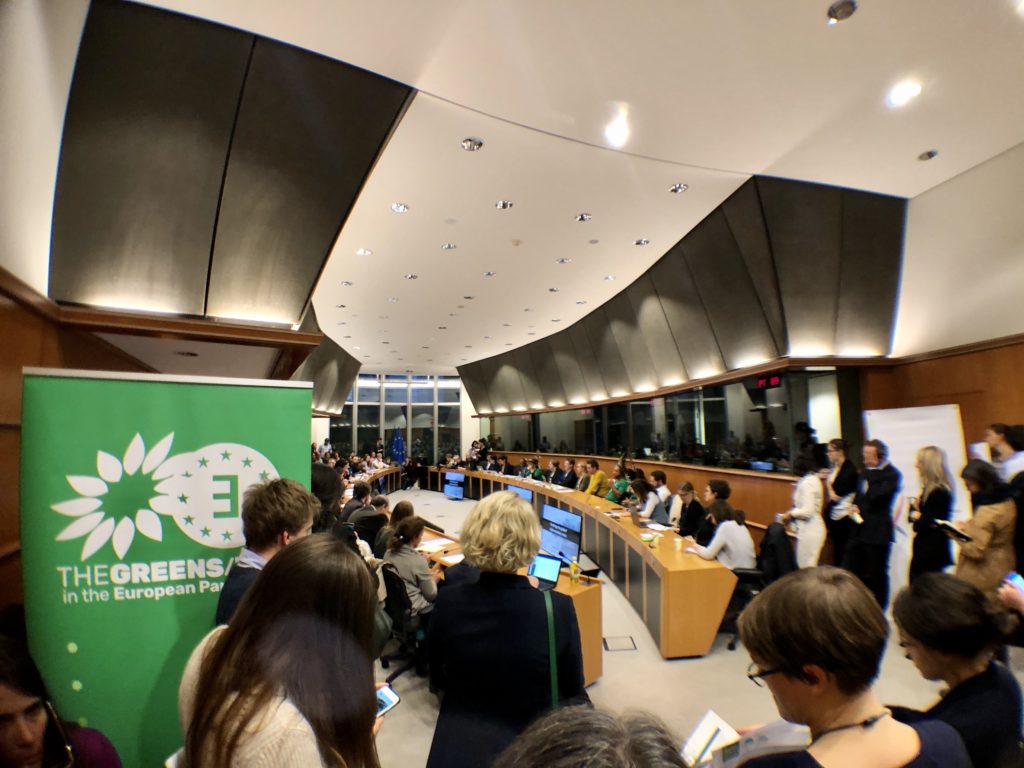Text by Jo Blackman, Global Witness
The blog was originally published on Global Witness website on 7th November 2019
Could European politicians be sitting up and finally paying real attention to climate breakdown? The last few months have seen strong rhetoric on a European Green Deal from the new European Commission, and the circle of interest around environmental destruction growing beyond the normal smaller circle of dedicated MEPs.
This increasing interest at a critical time was visible on Tuesday afternoon, when Global Witness sat alongside the chairs of three European Parliament committees, indigenous leaders, companies, and organisations such as FERN and ClientEarth in the European Parliament and called for urgent action on global deforestation.
With over 100 attendees there was standing room only and speakers issued a resounding collective call for the EU to take action now – by introducing binding due diligence to protect planet and people.
Deforestation is a major threat to our ability to avert climate breakdown, yet too few companies are taking the action needed to reduce or eliminate deforestation in their supply chains and financing. Powerful testimony from indigenous leaders in Brussels this week highlighted the huge impact destruction of the Amazon has on its people. It is time for European policy makers to listen to the demands of indigenous activists and land and environmental activists.
Even though nowadays green is the new black in our financial centres and corporate PR campaigns, big household names still have deforestation in their supply chains and still bankroll the destruction of the world’s largest forests with few apparent consequences or costs.
We recently found that a number of giant, global agribusinesses who have been razing forests to produce palm oil, beef and rubber have received financial backing from some of the biggest names in banking. They include some of the world’s top investment banks – Barclays, JP Morgan, Goldman Sachs, Bank of America and Morgan Stanley – as well as household European names like Santander, HSBC and Deutsche Bank. We were shocked to find that financial institutions based in the Europe were the biggest source of financing, after Brazil.
These revelations offer a snapshot not just of how international finance is driving deforestation and the destruction of lives and homes, but how a deep flaw lies at the heart of our financial system.
Many banks and financiers have policies to tackle deforestation, or made public commitments in the same vein. But when they’ve collectively ploughed billions into companies actively destroying the world’s largest rainforests, it raises the question of whether these promises are worth the paper they’re written on. Rather than relying on flimsy assurances, we need legally binding rules in the form of mandatory due diligence to be put in place by the EU. These must ensure the financial sector and companies undertake checks on their supply chains and financing to identify, mitigate and prevent their impact on the environment and human rights.
Due diligence is an established business practice when it comes to commercial and legal risks. And some businesses are already doing this for environmental impact. There are even internationally agreed OECD guidelines, which set out how these checks should be undertaken in relation to environmental, social and governance issues. The EU has led the way on embedding due diligence in regulation for conflict minerals, timber and sustainable finance – in fact in our recent briefing we look at the lessons to learn from these sectors.
It is now down to the EU to embed this due diligence on deforestation risk as a norm via regulation so that all businesses routinely identify, mitigate and prevent these risks. This shift in corporate culture would see companies and financiers take responsibility for environmental and human rights impacts. This would level the playing field so companies who are prioritising the environment are not penalised by undercutting from those who are more reckless in the search of profit.
Tinkering with existing regulation is inadequate to meet the current challenge – for example addressing only illegal (and not unsustainable) deforestation through the EU’s Timber Regulation or addressing only what the very biggest companies report via the Non-Financial Reporting Directive.
Policy-makers should also beware of apparent quick fixes like labelling that will not embed the shift in corporate culture that is required. Experience shows that labelling and certification are fraught with problems of verification and enforcement. They also risk abdicating companies of their responsibility by shifting the choice to consumers. If all goods were deforestation-free consumers wouldn’t need a label – surely that should be the aspiration.
It is vital that regulation covers the role of finance, not just companies. Their cash is a crucial link in the supply chain – supplying the cash to fund the operations. The recent ground-breaking French law on due diligence applies the same requirements to companies and financial institutions and the EU should do the same. Otherwise, we risk letting finance off the hook and creating double standards when it comes to who can profit from destruction of the world’s forests.
Only schemes like due diligence – that require rigorous and ongoing checks, as well as mitigation and prevention of risks, throughout the supply and financing chain for all actors – including finance, will deliver the change required to ensure that companies take action to address the environmental impact of their operations.
This week, we left the European Parliament hopeful that its politicians could be the leading force in stopping the environmental destruction of our planet – by championing regulated global supply-chains and binding due diligence for companies and financiers. We hope this optimism isn’t misplaced, and that policymakers seize the opportunity to make a lasting difference for people and planet.

